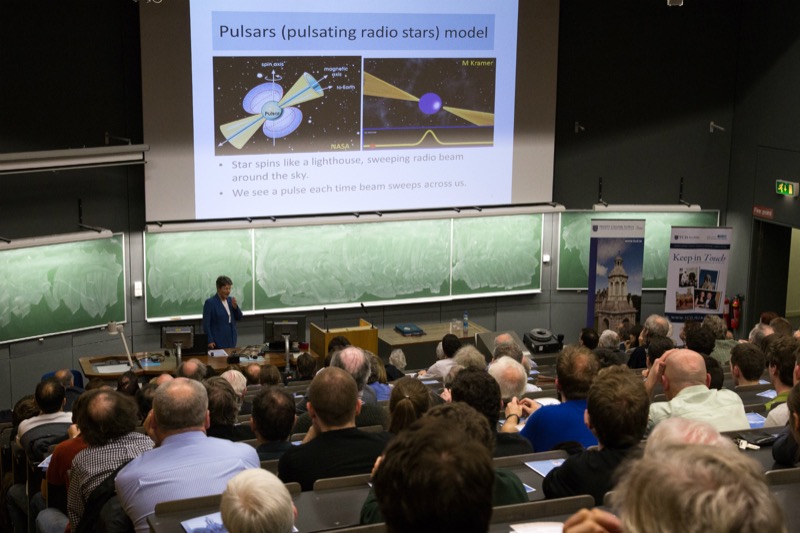Tests of Einstein’s General Relativity Discussed at ‘Hamilton Scholars’ Launch
Posted on: 20 November 2014
Dame Jocelyn Bell Burnell spoke to an audience of 300 about ‘Pulsars and Tests of Einstein’s General Relativity’ at the 12th JL Synge Public Lecture, which was recently hosted by Trinity College Dublin’s School of Mathematics. The occasion was doubly special as Argia Rubeo was welcomed to the School as the first ‘Hamilton Scholar’ at the official launch of the prestigious scholarship programme.
Dame Jocelyn Bell Burnell was involved in the discovery of pulsars, which are highly magnetised, rotating stars that emit beams of radiation which are only observed when they point at the Earth; this characteristic means they are useful for mapping the galaxy as well as measuring other astronomical phenomena with incredible precision. Their regularity of pulsation makes them more precise time-keepers than atomic clocks. Unsurprisingly, the discovery of pulsars opened a new branch of astrophysics.

Dame Jocelyn Bell Burnell has received many prestigious prizes and awards, including an honorary Sc. D degree from Trinity College Dublin in 2008; she was also elected Pro-Chancellor of Trinity in 2013.
The Head of Trinity's School of Mathematics, Professor Sinead Ryan, said: “We were delighted to welcome Dame Jocelyn to Trinity and to hear her engaging review of how Einstein's general theory of relativity is being tested through astronomical observations of pulsars orbiting other bodies. The modern era of precision astrophysics has opened up so many interesting questions for theoretical physicists to try to answer. We were also happy that her inspiring address to young researchers coincided with the launch of the Hamilton Scholars programme.”
The Hamilton Scholars programme aims to produce a cohort of exceptional PhD students whose work is expected to have a significant international impact. With the School’s international perspective, the programme will help to supply the national and global demand for the next generation of technically trained researchers, academics and educators. Trinity plays a leading role internationally in research in Algebra and Number Theory, Analysis, Partial Differential Equations, Quantum Field Theory, Lattice Quantum Chromodynamics, and String Theory.
Scholarships will be awarded to PhD students of outstanding talent, from Ireland and internationally, who will be selected to study a new and unsolved problem in mathematics or theoretical physics. To address the gender imbalance in these disciplines, female candidates will be sought and specifically encouraged to apply.
The scholarships are named in honour of Sir William Rowan Hamilton, one of the world’s most revered scientists and mathematicians, who studied and taught at Trinity in the 1800s. Hamilton made seminal contributions to the mathematical foundations of dynamics and the Hamiltonian formulation of classical mechanics laid the foundations for quantum mechanics.
Hamilton is also known for his discovery of quaternions; a system that extends the complex numbers and can be applied to study mechanics in three-dimensional space. Today, quaternions are used to more efficiently perform the calculations needed in applications such as computer game animation and guiding spacecraft. Unforeseen uses of purely mathematical concepts demonstrate the importance of supporting fundamental research, as exemplified by the Hamilton Scholars programme.
